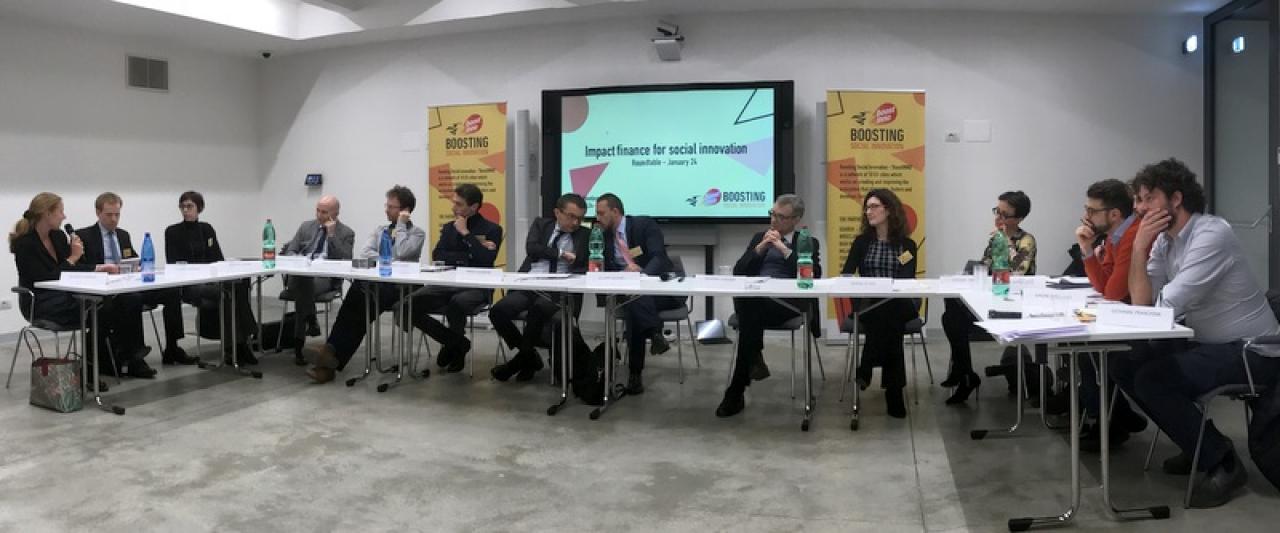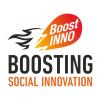
Last transnational meeting of BoostINNO in Milan was focused on social impact. On 24th January roundtable on Impact finance for social innovation was organised with experts and representatives from various financial institutions.
Impact investing refers to investment whose positive impact is intentional and measurable. These features can be summarized in the concept of intentionability.
In the impact finance industry, there is a problem of lack of demand, rather than of supply, of capital. Supply of capital is increasing much faster than demand, much faster than demand side is ready to receive investment; there is a problem of investment readiness on the demand side. The demand side, the deal flow is the real constraint.
A new, hybrid model of entrepreneurship is emerging. There is now a new candidate, referred to as social venture, a sort of hybrid entity that does not come strictly speaking from the third sector, but comes also from the hybridation of mainstream finance models.
There is a problem of additionality. A key concept is the importance of understanding the difference between counting just what has happened from a non financial perspective, and understanding its causes, that is, the difference between just the positive externality, that may be accidental, and the intentionality behind it.
Another point is how to scale social innovation. How to get a social idea, a startup, to grow in scale? There seems to be a difference between the commercial sector and the social innovation: while in the commercial sector the focus in on the financial exit, i.e. whom to sell the business to, and the big corporates look at the idea of conglomeration, becoming bigger and larger and dominating markets, social innovation focuses on federation.
The following main challenges were identified:
- The lack of standards in impact measurement
- The possible unattended consequences of measurements.
Impact measurement is crucial in the impact finance industry. Impact investment can be referred to as investing in people’s prosperity, putting people at the centre of the scheme. As people are the real outcome of impact investment, measuring the outcome is challenging, as everything about people is so complex as there are many variables to analyze.
In the asset class of impact investment, which is different from the sustainable finance one, measuring impact is necessary. The challenge for impact finance is to finance intangible assets. There are people and solutions to problems inside tangible assets, urban regeneration, and those are the target.
The Public Administration can play a fundamental role on both demand and supply side of impact finance. Local administrations may act on the development of social enterprises and on the integration of public finance with impact finance, for instance, through pay for result schemes.
Importantly, these instruments are affecting the way the public administrations are looking at their performance measurement and the way they do their procurement with social services. So, this can be a very useful instrument to change the managerial culture in PA, change the way they measure their impact and manage their services.
The public administrations play a role also through public procurement: as an example, a structure linking a set level of the value of the project to environmental and social impact, would be a way for both the public and private sector to mainstream impact finance.
The European Investment Bank has a mission to achieve the EU’s strategic objectives; therefore, it has already a social impact component. Impact investment market is important to the bank in raising its funds, through the issue of Green Bonds. EIB is already a big investor in social innovation. The EIB group, through the EIF, has established for example the Social Impact Accelerator Fund[1], an EU wide fund of funds that combines EIF funds with those of a number of private institutions to invest equity in social enterprises.
The JESSICA initiative, developed by EIB and the EU Commission in the previous programming period, 2007-2013, offers a snapshot of what financial instruments can provide in terms social impact. In Italy, JESSICA supported the construction of a centre for disabled people, built and managed by ANFFAS, which is an Italian disabled people’s association, through a medium sized project. Another project in Naples, allowed the regeneration of a former brewery with a social aggregation component. This initiative was a way to support municipalities to think, to change the paradigm and to make some investments with real social impact on the ground.
The extension of the EFSI programme, that is increasing the investment target from €315 billion to at €500 billion and the timeline from 2018 to 2020, and, for the first time, and includes social impact as one of its objective, is a signal that the EU Commission is recognizing its importance.
Action points
- Social value procurement is a huge opportunity for cities to contribute for; if they embedded that in their procurement policies, they would be creating the ecosystem.
- Embedding social impact into urban development funds and policies recognizing the human scale, is another thing that would drive the developers to look out for good ideas and generate the ecosystem.
- Social impact contracting. Social impact bond, but that is only one kind of contracting. We have a huge amount of public expenditure that every year support social services. If even 5% of that could be freed to fund innovative social impact projects, that would have a huge impact on creating the ecosystem. URBACT and other initiatives can support cities with that. Cities must not underestimate their soft powers.
- Technical support is available to cities through URBACT and other initiatives (FI Compass, URBIS, European Investment and Advisory Hub).
- More investigation is needed on the connection between impact investment and sustainability as the narrative on SDGs and impact investing come along on different routes.
- Data on the characteristics and features of social innovators would be very useful for municipalities, who look for a target when starting a new policy.
List of participants of rountable:
Keynote speakers:
Desmond Gardner, Financial instruments Advisor at the European Investment Bank https://www.linkedin.com/in/desgardner/
Mario Calderini, Full Professor of Strategy and Social Innovation at Politecnico di Milano https://www.linkedin.com/in/mario-calderini-134b064/
Filippo Addarii, CEO PlusValue - Moderator https://www.linkedin.com/in/filippo-addarii-7604891/
Adriana Versino - Oltre Ventures https://www.linkedin.com/in/adriana-versino-38b178/
Simone Fumagalli - Banca Prossima https://www.linkedin.com/in/simonefumagalli/
Giovanni Franchina - Bepart Società Cooperativa Impresa Sociale https://www.linkedin.com/in/giovanni-franchina-b2504989/
Marco Zappalorto - NESTA Italy https://www.linkedin.com/in/marco-zappalorto-a9a59517/
Francesco Mandruzzato - Lendlease https://www.linkedin.com/in/francesco-mandruzzato-530329/
Fiorenza Lipparini - PlusValue https://www.linkedin.com/in/fiorenza-lipparini-30418344/
Arianna Lovera - Forum per la Finanza Sostenibile https://www.linkedin.com/in/arianna-lovera-27936825/
Denise Di Dio - Tiresia, Politecnico di Milano https://www.linkedin.com/in/denisedidio/
Daniele Alfonsi - EIB https://www.linkedin.com/in/daniele-alfonsi-b300023/
Alberto Boem - Banca Etica https://www.linkedin.com/in/alberto-boem-03016441/
Karl H Richter – UNDP https://www.linkedin.com/in/karlhrichter/

